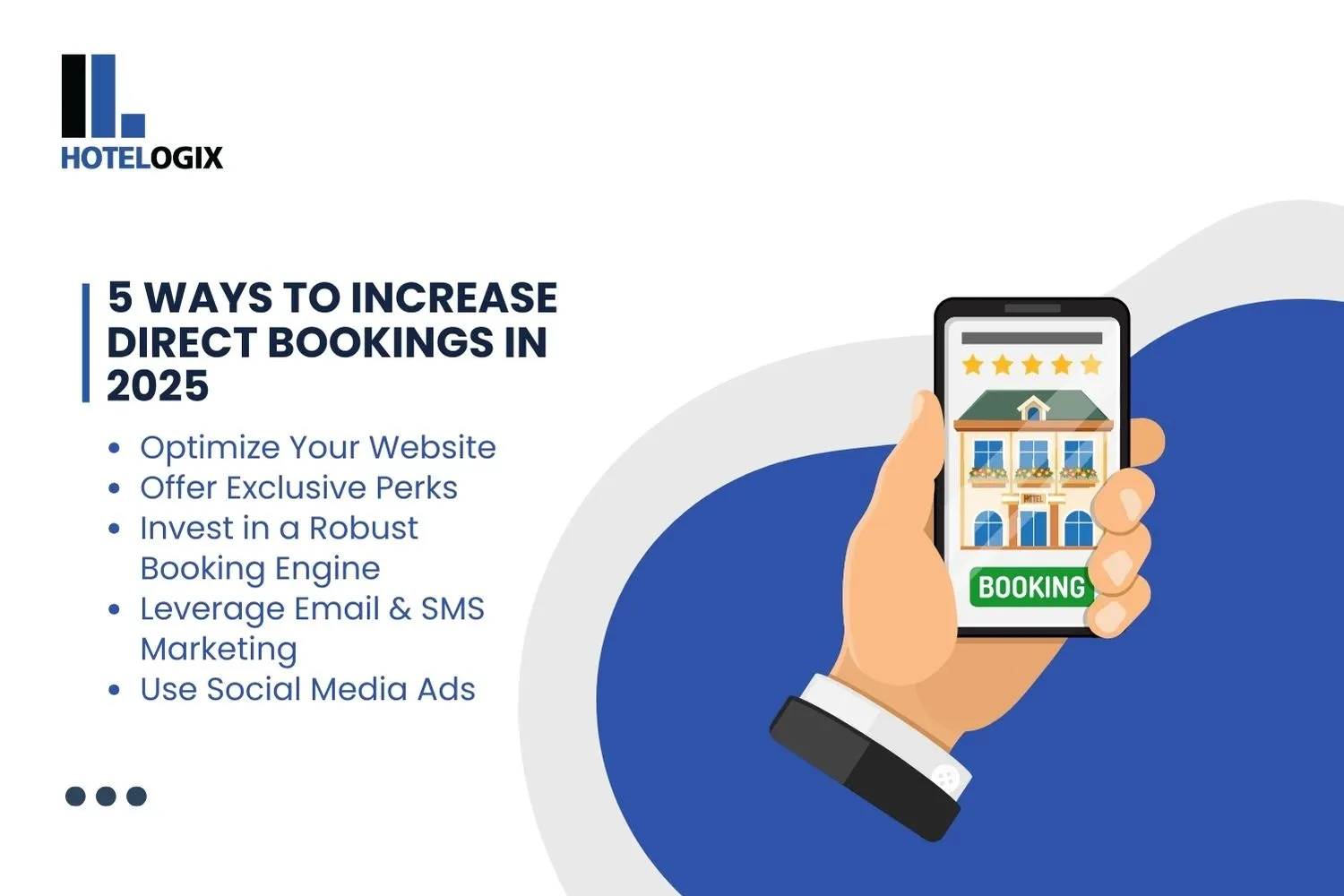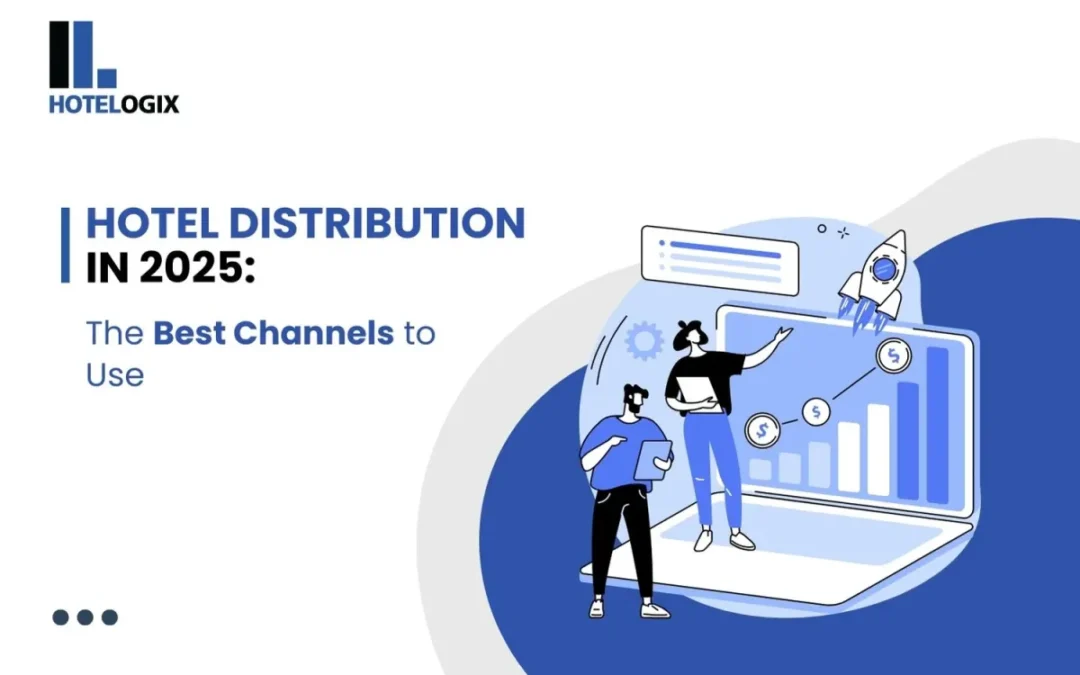Introduction: The Hidden Revenue Killer for Hotels
Did you know that hotels utilizing a mix of OTAs, metasearch engines, and direct booking strategies experience significantly higher revenue growth than those relying on a single channel? According to a study by Hospitality Insights, hotels that adopt a multi-channel distribution strategy can see an increase in direct bookings by 20-30%, improving their overall revenue performance. (Source: Hospitality Insights) Yet, many hoteliers still depend on one or two booking platforms, missing out on thousands of potential guests every year.
With the hotel industry in the USA valued at $114.7 billion (Source: Statista), relying on a limited number of hotel distribution channels is a surefire way to lose revenue. This article explores the top 10+ distribution channels, the biggest travel industry trends, and strategies to drive direct bookings while reducing OTA commission fees.
The $800 Billion Hotel Booking Market: How Distribution Channels Work
What Are Hotel Distribution Channels?
Hotel distribution channels are the platforms or mediums that enable travelers to discover, compare and book hotel stays. Such channels include:
- Online Travel Agencies (OTAs) – Third-party booking platforms like Expedia & Booking.com.
- Metasearch Engines – Google Hotel Ads, Kayak and Trivago collect prices directly from OTAs and direct websites.
- Direct Booking Platforms– the hotel website and booking engine.
- Global Distribution Systems (GDS) – Used mainly for corporate travel bookings.
- Alternative Channels – Social media, WhatsApp, and influencer marketing.
The key to higher occupancy rates and maximized revenue? Diversification across multiple channels.
The 5 Most Powerful OTAs in the USA (You Can’t Ignore These!)
Why OTAs Still Dominate in 2025
Fact: OTAs account for 52% of online hotel leisure sales (Source: Phocuswright) in the USA, This makes them a key component of any distribution strategy, no matter how small or large the hotel is. As attractive as exposure and access to an international market is, it is not all that great on the other end: commissions between 15% to 25% per booking will eat away at hotel profit margins. This has hotels balance higher occupancy levels with the use of OTAs.
The 5 Most Influential OTAs in the USA
- Expedia Group – Includes Expedia, Hotels.com, Travelocity, Orbitz.
- Booking Holdings – Consists of Booking.com, Priceline, Agoda.
- Airbnb & Vrbo – Short-term rentals are merging with hotels.
- Tripadvisor – More than reviews: A strong OTA.
- HotelTonight – The go-to platform for last-minute bookings.
Niche OTAs That Drive High-Value Guests
- Mr & Mrs Smith – Luxury & boutique travelers.
- Tablet Hotels – Design-conscious, high-end travelers.
- Despegar – The #1 OTA for targeting Latin American tourists.
Why use niche OTAs? Hotels listing on specialized platforms often see a 20% higher ADR (Average Daily Rate).
Learn How Metasearch Helps the Hotels in Reducing OTA Fees
Metasearch engines aggregate hotel prices from different OTAs and direct booking platforms, allowing hotels to attract high-intent travelers at a lower cost than OTAs.
The 3 Metasearch Giants in 2025
- Google Hotel Ads – The #1 metasearch platform globally.
- Trivago – 5+ million daily hotel searches.
- Kayak – Owned by Booking Holdings, but pushes direct bookings.
Hotels that invest in metasearch ads can experience an increase in direct bookings, as studies have shown that metasearch platforms significantly influence customer decision-making (Source: Skift) since those platforms would lead travelers to view prices in real-time and thereby redirect them toward the official websites of the hotel, which makes it more possible to receive bookings directly without paying OTA commissions.
Three Key Travel Industry Trends for 2025
1. Voice Search & Smart Assistants
Nowadays, people have smart devices like Alexa and Google Assistant. They can use them to search for hotels using just their voice! It’s like magic! A report says that more and more people will use voice search to book hotels in the future. This is especially true for young people and busy travelers who like easy and quick bookings. Hotels that make their websites voice search friendly and use AI chatbots can get more guests and make them happy.
2. Blockchain in Hotel Bookings
Blockchain is a new technology that is changing how hotels work. It makes booking cheaper and safer. It also removes the need for middlemen. Blockchain helps hotels reduce scams and makes pricing clear. It also makes payments faster and easier, so everyone can trust the booking process.
3. Sustainability-Driven Travel
Many travelers now care about the environment. They prefer hotels that are eco-friendly. Hotels can do things like saving energy and water, reducing waste, using local and organic food, and supporting programs that help the environment. Some hotels even get special certifications to show they are green. By doing these things, hotels can attract guests who care about the planet and help make travel more sustainable.
Direct Bookings: Why They Should Make Up 40% of Your Revenue
Why Direct Bookings Matter More Than Ever
Hotels save 15-25% on an average booking by getting guests to book directly with them rather than through an OTA. This results in a much higher profit margin for hoteliers, which can be reinvested in more desirable guest experiences, better amenities, and more personalized services. Direct bookings also allow hotels to develop direct relationships with their guests, which translates into loyalty and repeat stays.
5 Ways to Increase Direct Bookings in 2025

- Optimize Your Website – Fast, mobile-friendly, and SEO-optimized.
- Offer Exclusive Perks – Discounts, late checkout, or free breakfast for direct bookings.
- Invest in a Robust Booking Engine – A seamless user experience leads to higher conversions.
- Leverage Email & SMS Marketing – Retarget past guests and website visitors.
- Use Social Media Ads – Target potential guests based on their online behavior.
Global Distribution Systems (GDS): The $150B Corporate Travel Market
Why GDS Still Matters in 2025
Despite the rise of OTAs, 60% of business travelers still book hotels through GDS platforms like:
- Amadeus – The largest GDS globally.
- Sabre – Dominates the North American market.
- Travelport – Used by 600,000+ travel agents worldwide.
Hotels targeting corporate travelers should optimize rates & availability on GDS networks.
How Hotelogix Can Help
Hotelogix is like a helpful computer program for hotels, an all-in-one cloud-based hotel management system. It works with lots of other websites where people book hotels like OTAs, metasearch platforms, GDS, and direct web booking engines, so everything is connected! This means hotels don’t have to worry about selling too many rooms by accident and can make more money.
How Hotelogix Helps Hotels
– Updates Everything Automatically: Hotels don’t have to change information on lots of different websites one by one.
– More Bookings on the Hotel’s Own Website: This means hotels don’t have to pay extra fees to other websites.
– One Place to See Everything: All the bookings are easy to find.
– Smart Reports: The program of smart reports gives helpful advice to hotels so they can choose the best prices and decide where to advertise their rooms.
Hotels Like It!
Lots of hotels that use Hotelogix get more bookings on their own website, which makes things easier for the hotel workers. One hotel in New York got way more bookings on their own website in just six months, and they didn’t have to worry about selling too many rooms anymore! For example, a mid-sized boutique hotel in New York implemented Hotelogix and experienced a 35% boost in direct reservations within six months, alongside a significant reduction in overbooking issues.
The Future of Hotel Distribution: What’s Next?
The Rise of Alternative Booking Channels
- Influencer & Affiliate Marketing – The hospitality industry has begun to form alliances with travel bloggers, YouTubers, and social media influencers in order to promote themselves to specific audiences. Since these influencers make authentic recommendations, the followers connect more easily and hence make trust-driven bookings. Affiliate marketing is the program hotels can use by encouraging digital content creators to push their properties to generate commission-based referrals.
- WhatsApp & AI Chatbots: Direct messaging apps such as WhatsApp, Facebook Messenger, and AI-powered chatbots are becoming essential tools for smooth guest communication. Hotels can use these platforms to answer queries, facilitate bookings, and offer real-time personalized promotions. This helps hotels reduce their dependency on OTAs and increase direct conversion rates while enhancing guest satisfaction.
Conclusion: The Ultimate Hotel Distribution Strategy for 2025
Final Takeaways:
OTAs are important, but hotels need to diversify and not be dependent on them. Metasearch engines drive high-intent traffic at a lower cost than OTAs. Direct bookings should account for at least 40% of revenue. Alternative distribution channels like AI chatbots and influencer marketing are game changers.
Hotelogix simplifies hotel distribution and helps maximize revenue.
Action Step:
Audit your hotel’s current distribution strategy today—how many channels are you on? If it’s fewer than six, you may be missing out on significant revenue opportunities. Take the next step in optimizing your distribution strategy by exploring Hotelogix’s advanced solutions that streamline multi-channel management, boost direct bookings, and enhance overall hotel performance.* If it’s less than 6, you’re leaving revenue on the table.

